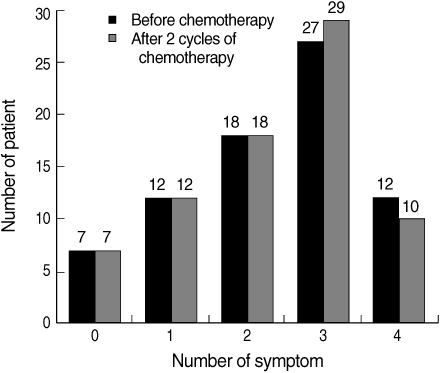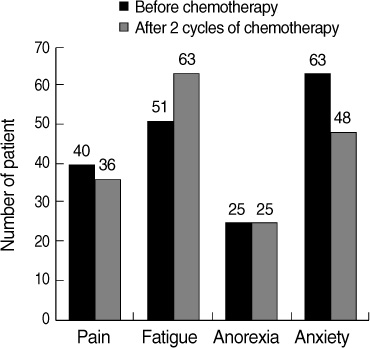Transition of Symptoms and Quality of Life in Cancer Patients on Chemotherapy
- Affiliations
-
- 1Jeju Regional Cancer Center, Jeju National University Hospital, Jeju, Korea. musemy2@hanmail.net
- KMID: 999313
- DOI: http://doi.org/10.4040/jkan.2009.39.3.433
Abstract
-
PURPOSE: The purpose of this study was to assess changes in pain, fatigue, anorexia, anxiety and quality of life (QOL) in patients with cancer who were on chemotherapy.
METHODS
Symptoms and QOL were examined both before chemotherapy and after 2 cycles of chemotherapy. The participants were 76 cancer patients receiving chemotherapy in one of 7 hospitals.
RESULTS
The patients experienced a mean of 2.22-2.23 symptoms out of 4 symptoms. Patients who were female, or suffered from breast or colorectal cancer experienced more symptoms. Fatigue at present, and most severe fatigue and anorexia in the previous 3 weeks increased significantly. Anxiety and QOL decreased significantly after 2 cycles of chemotherapy. Number of symptoms, anorexia at present, most severe anorexia in past 3 weeks, and anxiety had negative correlations. QOL before chemotherapy showed a positive correlation with QOL after 2 cycles of chemotherapy. In a regression analysis, anxiety, QOL at baseline, income, and the most severe pain in the past 3 weeks were significant predictors of QOL.
CONCLUSION
Physical and psychological factors were significant predictors of both QOL and each subscale, and these factors correlated with each other. These results demonstrate the needs for early assessment and intervention from the start of chemotherapy to decrease symptoms and improve QOL
Keyword
MeSH Terms
Figure
Cited by 7 articles
-
Changes of Symptom Distress and Quality of Life in Breast Cancer Patients Receiving Adjuvant Therapy
Jin-Hee Park, Sun Hyoung Bae, Young-Mi Jung
Asian Oncol Nurs. 2015;15(2):67-74. doi: 10.5388/aon.2015.15.2.67.Effects of Telephone Counseling Support on Distress, Anxiety, Depression, and Adverse Events in Cancer Patients Receiving Chemotherapy
Oh Nam Ok, Min Sun Nam, Mi Sun Yi, Seon Mi Cho, Eun Ji Kim, Yun Hee Ham, In Gak Kwon
Asian Oncol Nurs. 2017;17(1):37-44. doi: 10.5388/aon.2017.17.1.37.Change of Cancer Symptom, Depression and Quality of Life based on Phases of Chemotherapy in Patients with Colorectal or Stomach Cancer: A Prospective Study
Pok Ja Oh, Soo Yeon Lim
Korean J Adult Nurs. 2017;29(3):313-322. doi: 10.7475/kjan.2017.29.3.313.Discomfort related to Peripherally Inserted Central Catheters in Cancer Patient
Misun Yi, Im-Ryung Kim, Eun-Kyung Choi, Seyoung Lee, Mikyong Kwak, Juhee Cho, Jin Seok Ahn, In Gak Kwon
Asian Oncol Nurs. 2017;17(4):229-236. doi: 10.5388/aon.2017.17.4.229.Anxiety, Depression and Uncertainty in Cancer Patients Participating in Clinical Trial of Anticancer Drugs
Haejin Kim, Myungsun Yi
Korean J Adult Nurs. 2013;25(1):53-61. doi: 10.7475/KJAN.2013.25.1.53.The Effect of Visual Information Blocking Nursing Intervention on Stress and Anxiety during Chemoport Insertion in Adult Cancer Patients of Operation Rooms
Mimi Lee, Wanju Park
Korean J Adult Nurs. 2018;30(2):194-205. doi: 10.7475/kjan.2018.30.2.194.Factors Affecting Sleep Disturbances in Hospitalized Patients with Colorectal Cancer undergoing Chemotherapy: A Retrospective Study
Jihyeon Song, Smi Choi-kwon
Korean J Adult Nurs. 2019;31(1):100-108. doi: 10.7475/kjan.2019.31.1.100.
Reference
-
1. Berger AM, Higginbotham P. Correlates of fatigue during and following adjuvant breast cancer chemotherapy: A pilot study. Oncology Nursing Forum. 2000. 27:1443–1448.2. Byar KL, Berger AM, Bakken SL, Cetak MA. Impact of adjuvant breast cancer chemotherapy on fatigue, other symptoms, and quality of life. Oncology Nursing Forum. 2006. 33:E18–E26.3. Choi SE, Park HR, Ban JY. Anxiety in patient undergone hematopoietic stem cell transplantation. Journal of Korean Oncology Nursing. 2006. 6:37–46.4. Chung BY, Yu X, Lee EH. Symptom experience, mood disturbance & social support in breast cancer patients undergoing radiotherap. Journal of Korean Oncology Nursing. 2006. 6:172–180.5. Chung CW, Kim MJ, Rhee MH, Do HG. Functional status and psychosocial adjustment in gynecologic cancer patients receiving chemotherapy. Korean Journal of Women Health Nursing. 2005. 11:58–66.6. Curt GA, Breitbart W, Cella D, Groopman JE, Horning SJ, Itri LM, et al. Impact of cancer-related fatigue on the lives of patients: New findings from the fatigue coalition. Oncologist. 2005. 5:353–360.7. Dodd MJ, Miaskowski C, Paul SM. Symptom clusters and these effect on the functional status of patients with cancer. Oncology Nursing Forum. 2001. 28:465–470.8. Doran DM, Harrison MB, Laschinger HS, Hirdes JP, Rukholm E, Sidani S, et al. Nursing-sensitive outcomes data collection in acute care and long-term-care settings. Nursing Research. 2006. 55:S75–S81.9. Fox SW, Lyon DE. Symptom clusters and quality of life in survivors of lung cancer. Oncology Nursing Forum. 2006. 33:931–936.10. Gong SH, Lee SH, Jung JH, Kim JY, Lee SY, Kim SA. The effect of cancer pain management education on the concerns and hesitancy of pain management in out-patient of terminal gastric cancer. Korean Clinical Nursing Research. 2004. 10:56–69.11. Harteveld JT, Mistiaen PJ, Dukkers van Emden DM. Home visits by community nurses for cancer patients after discharge from hospital: An evaluation study of the continuity visit. Cancer Nursing. 1997. 20:105–114.12. Hur HK, Lee EH, Lee WH, So HS, Chung BY, Kang ES. Symptom occurrence related to disease characteristics of adult patients with cancer. Journal of Korean Academy of Adult Nursing. 2002. 14:411–417.13. Itano JK, Taoka KN. Core Curriculum for oncology nursing. 1998. 3rd ed. Philadelphia, PA: Oncology Nursing Society.14. Kim HS, Lee SW, Yun YH, Yu SJ, Heo DS. Gender differences in pain in cancer patients. Journal of Korean Hospice and Palliative care. 2001. 4:14–25.15. Kim JY, Shin DK. A study based on the standardization of the STAI for Korea. The New Medical Journal. 1978. 21(11):69–75.16. Kim MY. Nursing outcomes in cancer patients cared by oncology advanced practice nurses during chemotherapy. 2008. Seoul: Seoul National University;Unpublished doctoral dissertation.17. Kim YJ, Cho IS, So HS. Changes on index of nausea, vomiting, and retching in hospitalized cancer patients undergoing chemotherapy. Journal of Korean Academy of Nursing. 2004. 34:1326–1333.18. Korean Central Cancer Registry (KCCR). 2002 annual report of the Korean Central Cancer Registry. 2003. Seoul: Ministry of Health and Welfare Affairs.19. Korean National Statistical Office (KNSO). Annual report of the cause of death in Korea. 2006. Seoul: Author.20. Korean Society for Hospice and Palliative Care (KSHPC). Korean Cancer Study Group (KCSG). Cancer pain guideline. 2002. Seoul: Koonja.21. Lee EO, Yi MS, Heo DS, Lee KS, Eom AY. Trajectories and related factors of fatigue in patients undergoing chemotherapy for lung cancer. Journal of Korean Oncology Nursing. 2001. 1:54–64.22. Lee JE. Symptom experiences according to chemotherapy cycle in patients with breast cancer. 2005. Seoul: Yonsei University;Unpublished master's thesis.23. Oermann MH, Templin T. Important attributes of quality health care: Consumer perspectives. Journal of Nursing Scholarship. 2000. 2:167–172.24. Sarna L, Cooley ME, Brown JK, Williams RD, Chernecky C, Padilla G, et al. Quality of life and health status of dyads of women with lung cancer and family members. Oncology Nursing Forum. 2006. 33:1109–1116.25. Sohn SK, Kim KH, Kim SH. Relationship between fatigue and functional status in patients with cancer. Journal of Korean Oncology Nursing. 2007. 7:3–13.26. Son HK, Kim SH, Sohn SK. Relationship between fatigue and depression in patients with hemato-malignancy receiving chemotherapy. Journal of Korean Oncology Nursing. 2007. 7:14–25.27. Spielberger CD. Anxiety current trends in theory and research, 1. 1972. New York, NY: Academic Press.28. Suh YO. Predictors of quality of life in women with breast cancer. Journal of Korean Academy of Nursing. 2007. 37:459–466.29. Weaver C, Schiech L, Held-Warmkessel J, Kedziera P, Haney E, Dilullo G, et al. Risk for unplanned hospital readmission of patients with cancer: Results of a retrospective medical record review. Oncology Nursing Forum. 2006. 33(3):E44–E52.30. Yabro CH, Frogge MH, Goodman M, Groenwald SL. Cancer nursing principles and practice. 2000. 5th ed. Sudbury, MA: Jones and Bartlett Publishers.31. Yang MJ, Jeon YW, Han SI, Han CW, Eom HS. Depression and pain in patients with cancer-A preliminary study-. Journal of Korean Neuropsychiatric Association. 2000. 39:1122–1131.32. Yang YH. Trajectory of fatigue, quality of life and physical symptoms in cancer patients receiving radiotherapy. Journal of Korean Academy of Nursing. 2003. 33:562–569.
- Full Text Links
- Actions
-
Cited
- CITED
-
- Close
- Share
- Similar articles
-
- Impact of Symptom Clusters on the Quality of Life in Lung Cancer Patients Undergoing Chemotherapy
- Symptom Cluster and Quality of Life in Patients with Breast Cancer undergoing Chemotherapy
- Changes in Chemotherapy-induced Peripheral Neuropathy, Sleep Quality, and Quality of Life following Chemotherapy in Stomach Cancer Patients: a Prospective Study
- A Study on Quality of Life of those who have Breast Cancer Patients taking Chemotherapy
- The Trajectory of Fatigue and Quality of Life in Stomach Cancer Patients Receiving Chemotherapy



